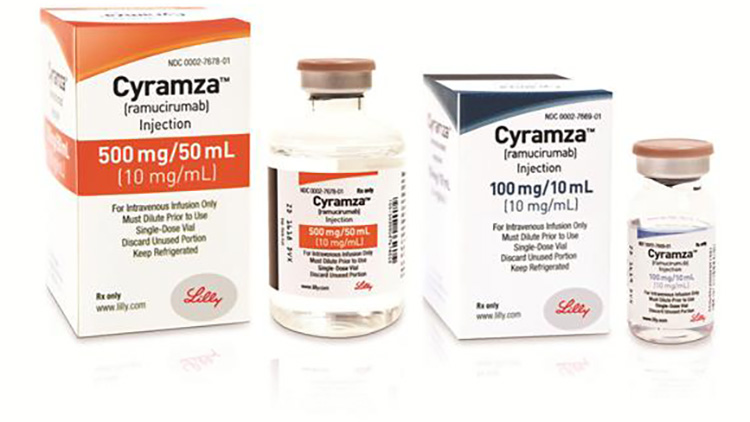Cyramza (ramucirumab) vs Krazati (adagrasib)
Cyramza (ramucirumab) vs Krazati (adagrasib)
Cyramza (ramucirumab) is a monoclonal antibody designed to target the vascular endothelial growth factor receptor 2 (VEGFR2), used primarily to treat various types of cancer, including stomach cancer, colorectal cancer, and non-small cell lung cancer by inhibiting tumor angiogenesis. Krazati (adagrasib) is a small molecule inhibitor that targets KRAS G12C mutant proteins, which are often found in certain cancers, including non-small cell lung cancer; it works by directly inhibiting the function of the mutated protein to halt tumor growth. When deciding between Cyramza and Krazati, the choice would be influenced by the specific type of cancer, its molecular profile, particularly the presence of a KRAS G12C mutation for Krazati, and the patient's overall health status and previous treatments, as these medications have different mechanisms of action and are used based on the tumor's characteristics.
Difference between Cyramza and Krazati
| Metric | Cyramza (ramucirumab) | Krazati (adagrasib) |
|---|---|---|
| Generic name | ramucirumab | adagrasib |
| Indications | Various types of cancers, including gastric cancer, non-small cell lung cancer, and colorectal cancer | Non-small cell lung cancer with KRAS G12C mutation |
| Mechanism of action | Angiogenesis inhibitor; monoclonal antibody targeting VEGFR-2 | Small molecule inhibitor targeting the KRAS G12C mutation |
| Brand names | Cyramza | Krazati |
| Administrative route | Intravenous infusion | Oral |
| Side effects | Hypertension, diarrhea, headache, and hemorrhage | Nausea, vomiting, diarrhea, and fatigue |
| Contraindications | Hypersensitivity to ramucirumab or any component of the formulation | Hypersensitivity to adagrasib or any component of the formulation |
| Drug class | Monoclonal antibody, angiogenesis inhibitor | KRAS G12C inhibitor |
| Manufacturer | Eli Lilly and Company | Mirati Therapeutics, Inc. |
Efficacy
Efficacy of Cyramza (Ramucirumab) in Lung Cancer
Cyramza (ramucirumab) is a monoclonal antibody that specifically targets the vascular endothelial growth factor receptor 2 (VEGFR2), which is involved in the formation of blood vessels that supply tumors with nutrients and oxygen. In the context of non-small cell lung cancer (NSCLC), Cyramza has been evaluated for its efficacy in several clinical trials. It is approved for use in combination with docetaxel in patients with metastatic NSCLC who have progressed on or after platinum-based chemotherapy. Clinical studies have shown that this combination can lead to an improvement in overall survival compared to chemotherapy alone. The increased efficacy of Cyramza in this setting provides a valuable option for patients with advanced NSCLC, particularly those who have limited treatment options after first-line therapy.
Efficacy of Krazati (Adagrasib) in Lung Cancer
Krazati (adagrasib) is a newer medication designed to target specific genetic mutations in cancer cells. It is a small molecule inhibitor that targets KRAS G12C mutations, which are present in a subset of NSCLC tumors. The efficacy of Krazati in lung cancer has been demonstrated in early clinical trials, where it has shown promising results in shrinking tumors with the KRAS G12C mutation. The drug is specifically tailored for patients with this mutation, and its efficacy is contingent upon the presence of KRAS G12C. As such, it represents a form of precision medicine, aiming to exploit the unique characteristics of a patient's tumor to achieve better outcomes.
Both Cyramza and Krazati highlight the shift towards more personalized treatment approaches in lung cancer. By targeting specific pathways or mutations, these drugs aim to improve the efficacy of treatment and provide options that are tailored to the individual characteristics of a patient's cancer. As research continues, the efficacy of these drugs may be further elucidated through larger, more comprehensive clinical trials, potentially expanding their use in different settings or in combination with other therapies for lung cancer.
It is important to note that the efficacy of any medication can vary from patient to patient and is influenced by many factors, including the stage and subtype of lung cancer, previous treatments, and a patient's overall health. Therefore, the decision to use Cyramza or Krazati should be made in consultation with a healthcare provider, who can consider the specifics of an individual's condition and the most current clinical evidence.
Regulatory Agency Approvals
Cyramza
-
European Medical Agency (EMA), European Union

-
Food and Drug Administration (FDA), USA

-
Health Canada

-
Therapeutic Goods Administration (TGA), Australia

-
Medsafe (NZ)

Krazati
-
European Medical Agency (EMA), European Union

-
Food and Drug Administration (FDA), USA

Access Cyramza or Krazati today
If Cyramza or Krazati are not approved or available in your country (e.g. due to supply issues), you can access them via Everyone.org.
How it works

Make an enquiry
Choose the medicine you want to buy, answer a couple of questions, and upload your prescription to speed things up. We’ll get back to you within 24 hours.


Make an enquiry
Choose the medicine you want to buy, answer a couple of questions, and upload your prescription to speed things up. We’ll get back to you within 24 hours.


Breeze through the paperwork
We'll guide you through the required documents for importing unapproved medicine, ensuring you have all the necessary information.


Get a personalized quote
We’ll prepare a quote for you, including medicine costs and any shipping, administrative, or import fees that may apply.


Receive your medicine
Accept the quote and we’ll handle the rest - sourcing and safely delivering your medicine.

Some text on this page has been automatically generated. Speak to your physician before you start a new treatment or medication.
Let's talk
If you have any questions, call us or send us a message through WhatsApp or email:
Contact us




